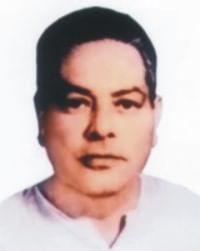Remembering Mohan Mia

Yusuf Ali Chowdhury (Mohan Mia)
IF any politician of this country is to be remembered for uncommon qualities of head and heart and for nearly half a century of dedicated and selfless public service, the name of Yusuf Ali Chowdhury, known as Mohan Mia, comes to the fore. He died on November 26, 1971 at the age of only 66, with his dream of making significant contribution to building the new country of Bangladesh remaining unfulfilled.
He knew from his own commitment to the cause of the Bengali language and the issue of political, economic and social justice for the Bengalis that liberation was imminent, and that it would need all the wisdom and efforts of the people and the political leaders to reconstruct the shattered land and take it onto the path of progress and prosperity. Post-liberation Bangladesh surely needed the services of wise, selfless and incorruptible politicians like Mohan Mia.
From an early age, Mohan Mia grew up in the district town of Faridpur as a courageous and visionary person. Instead of letting the riches of the family zamindari spoil him, he fixed his eyes on ways to lift the Muslims from the morass of social and economic backwardness. Compared to the educated, more affluent and influential Hindus, the Muslims lived almost as outcastes with no voice to ask for their rights. He soon found that their aversion to education, particularly to the English education under the British colonial dispensation, was the prime cause of their downslide in the society.
From his school days he proved his mettle as a Muslim standing up for a cause, although he was never a communal zealot. In fact, during his 17 years of chairmanship of Faridpur District Board, he succeeded in keeping the district free from communal violence although the whole of British India was affected by this scourge. His pioneering efforts at establishing educational institutions and a multi-sector vocational training centre in the district town spoke eloquently of his foresightedness for social progress.
In politics, Mohan Mia was an ardent adherent of high principles and moral values. His love for politics often threw him into personal debt, forcing him to dig into the estate coffers for money. He himself led a very simple life, with almost acetic habits in eating and dressing. Because of his close association with Sher-e-Bangla A.K. Fazlul Huq and Huseyn Shaheed Suhrawardy, he could have become a minister, but opted to become a king-maker.
In 1933, he decided for the first time to contest for a seat in the Bengal Legislative Assembly. But from where? Despite stiff opposition from his family members and friends, he gave away his own safe and secure constituency within his zamindari in favour of Moulvi Tamizuddn Khan, regarded by him as his political guru. This was a very rare gesture, demonstrating his large-heartedness and respect for a person who he thought was more qualified to serve the people. He chose the Shibchar Sadarpur Bhanga, constituency to challenge powerful zamindar Chowdhury Shamsuddin Ahmed, known as Badshah Mia, of Duttapra.
Mohan Mia won the seat and A.K. Fazlul Huq formed the government in Bengal in coalition with the Muslim League. But in 1941, Fazlul Huq severed his ties with the Muslim League and formed a new government in association with the Congress. Mohan Mia stayed on in the League and played a significant role in the party. Fazlul Huq was angry but Mohan Mm did not budge from his stand.
Despite political differences with many, Mohan Mia never kept anyone away or denied anyone his family's traditional hospitality. Many famous politicians of India and Pakistan, including Congress and Muslim League leaders, visited Faridpur on different occasions and enjoyed the generous hospitality at Mohan Mia's family house "Moiz Manzil."
His dream of setting up a jute mill in Faridpur has been fulfilled by his able sons. His other dream of setting up a sugar mill became a reality thanks to the efforts of his elder brother Muazzem Hussain Chowdhury (Lal Mai), who was once a well-known Congress leader and, later, a minister in Pakistan. The most important legacy of Mohan Mia still remains the Halima Student's Home in Faridpur, bearing the memory of his mother.

 For all latest news, follow The Daily Star's Google News channel.
For all latest news, follow The Daily Star's Google News channel. 



Comments